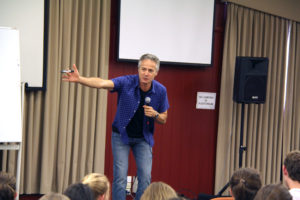SUCCESS IN VCE AND BEYOND
This seminar challenges students to consider what it means to them to be successful, not only in VCE but in the ongoing journey of life. Confronted with ‘big picture’ issues such as who they are, what is important in life, and who they aspire to become, VCE is presented to students as much more than an academic quest, but rather as an important foundation for one’s personal development, empowerment, and ongoing ‘education of life.’
Young people will be challenged to:
- consider VCE as a stepping stone to the rest of their lives; a means to an end not an end in itself
- be clearer about why they’re doing VCE – the VCE ‘formula’
- not take opportunities or their schooling for granted
- appreciate the intrinsic value of education
- give VCE their best shot
- consider the importance of a mentor/confidante
- develop their confidence, self-esteem, and resiliency
- relieve some of the pressure of VCE
- embrace Arthur’s practical ‘Tips for VCE’ (or VCAL) success
- think for themselves and make positive choices
- appreciate their leadership role and potential
- develop a social conscience
- achieve holistic balance – the metaphor of the ‘4-Legged Stool’
- build a successful future and get the most out of life
Timeframe:
a) Standard– approximately 60-90 minutes
- Incorporating the above topics and question time
- An opportunity to debrief with Arthur for students who need to
b) Three parts– up to 3 hours (with a break)
- ‘School Reunion’ – an interactive activity where students imagine what life will be like for them in 20 years time at a school reunion. A fun icebreaker that gets students thinking about their personal lives, aspirations and values, etc.
- Talk on ‘Success in VCE and beyond’ – incorporating Arthur’s story
- Tips for VCE: an hour-long PowerPoint presentation about how to get the best out of oneself in VCE – with accompanying handout
This seminar is suitable for students commencing Year 11 and 12, or for those who are about to enter VCE
THE PRISON SYSTEM (Legal Studies students)
Imprisonment is society’s most severe sanction. However, apart from media (mis)representations, how many of us really know, or care, about prisoners? Who are they and why do they end up in prison, what happens to them there and, importantly, after they’re released back into the community? Drawing on over thirty years of academic, professional, and lived experience, Arthur addresses these and related issues.
Topics: • The history of Western imprisonment
• Sanctions & the aims of imprisonment
• Corrections Victoria – facts & stats
• Who are prisoners & where do they come from?
• Experience of imprisonment – including Arthur’s personal story
• The ‘pains of imprisonment’ – a series of deprivations
• Institutionalisation v. Rehabilitation
• Problems of release and reintegration
• Liminality – the space between captivity & freedom
• The needs of transitioning prisoners
• Future directions
• Discussion / workshop – follow-up project
Timeframe (options)
- Up to 2 hours – audio-visual, overview of imprisonment, Arthur’s story, questions
- 3 hours/full day+ – the above plus ‘Prison Reform Project’ workshop (either on the day or as a follow-up activity over several weeks), whereby groups of collaborating students produce a report of proposed reform measures – the best proposal presented back to the wholegroup by the winning team
- Seminar can be modified to meet your particular needs
Fee negotiable: based on socio-economic circumstances and other variables
Available referees:
– Dasha Lepustin – Legal Studies, Flinders C C College 9785 0000
– Gabrielle Wilson – Legal Studies, Toorak College 9788 7200
– Eleni Stavrou – Legal Studies, Lilydale High School 9735 5644
– Dr Diana Johns – Lecturer in Criminology, Melbourne Uni 0425 791 934
– John Walsh – Bridge of Hope Foundation (at-risk youth) 0406 799 979
– Mick Cronin -YMCA Bridge Program (young offenders) 0424 444 299
A CHRISTIAN RESPONSE TO IMPRISONMENT
The late 18th century model of the prison, the penitentiary, was founded by Christian leaders who wanted to reform lawbreakers through a strict regime that included religious edification. But by the early 20th century, as religious influence diminished the notion of ‘reform’ was displaced by its secular equivalent: ‘rehabilitation.’ However in an era of unprecedented prison growth Christian influence has persisted, arguably flourished, raising important socio-religious issues with far-reaching implications.
Content: (additional information available upon request)
- Christianity-imprisonment – an enduring relationship
- Why ministry to prisoners matters
- Criminal Justice System
- The ‘Correctional’ System
- Who are prisoners?
- Experience of imprisonment
- Problems of release
- Needs of returning offenders
- Particular problems of the Christian releasee
- The ‘Criminal-Christian’ paradox – can a criminal be a Christian?
- Possible reform measures
- Future directions
- Arthur’s story
- Discussion/workshop/follow-up project (3 options depending on timeframe)
Timeframe:
- Up to 2 hours – overview / optional follow-up exercise by teachers
- 3 hours / full day – audio-visuals, workshop activity / ‘Reform Project’
- Seminar can be modified to meet your particular requirements
Cost: dependent on timeframe and other variables
Audience: middle / senior school students
Numbers: unlimited
Requirements: microphone, whiteboard, audio-visual equipment, photocopies
Availability: all-year-round, Australia-wide
